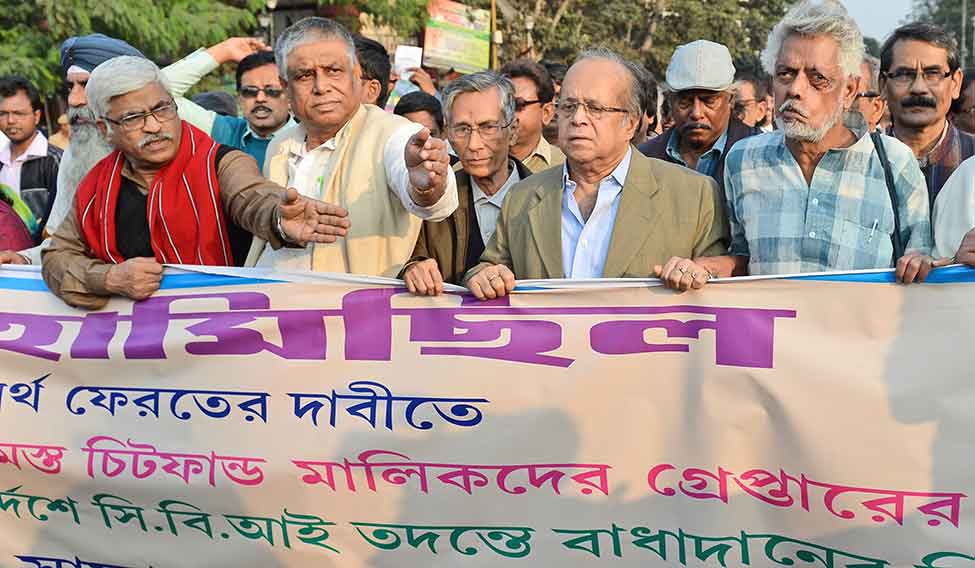Desperate times call for desperate measures, or so the CPI(M) in West Bengal thinks. Leaders of the party have been talking with the Congress about forging an alliance to take on the ruling Trinamool Congress in the assembly elections due in May. Apparently, the response has been encouraging to them.
On February 1, Congress leaders from the state met party vice president Rahul Gandhi and told him that they were against joining hands with the Trinamool Congress. Most of them reportedly recommended a tie-up with the CPI(M). Some leaders like Manas Bhuiyan and Abhijit Mukherjee, however, wanted the party to go it alone.
Rahul reportedly assured them of a decision that would not ignore the majority view. “He knows what the majority wants,” said Abdul Mannan, who attended the meeting. “He also got the point that no one wanted to go with the Trinamool Congress. So we are hopeful that the Congress and the CPI(M) together can remove Trinamool from power.”
Critics say such an alliance, if it does materialise, will only show that both the parties are in the grip of identity crises. The CPI(M) has realised that its campaign against Chief Minister Mamata Banerjee needs new tactics to succeed. It has decided to field ‘nonpolitical faces’ in the election—something it had not done while it was in power for 34 years in West Bengal. The CPI(M) is planning to pit activists and well-known persons from fields such as arts, literature, television and cinema against Mamata and other Trinamool heavyweights such as Amit Mitra, Partha Chatterjee, Bratya Basu and Aroop Biswas.
An analysis of the 2014 Lok Sabha elections showed that Trinamool could not have won 69 assembly segments in the state, had there been an alliance between the CPI(M) and the Congress. Trinamool won 39 per cent votes and the BJP, 17 per cent. Left parties together bagged around 28 per cent votes and the Congress, 9 per cent. In the absence of a Modi wave, the CPI(M) and the Congress hope to increase their combined vote share of 37 per cent. Add to it the anti-incumbency factor, and the parties believe they can spring a surprise in the assembly elections.
The CPI(M) and the Congress know that, for their plan to succeed, they need to field the right candidates in the right seats. But they have started off on the wrong foot. The CPI(M) wanted retired Supreme Court judge A.K. Ganguly to contest against Mamata at Bhowanipore, where the Trinamool Congress trailed the BJP by around 5,000 votes in the last Lok Sabha election. The party apparently thought Ganguly was a good choice for a candidate, as he had been at the forefront of the recent protests against the Saradha scam and the deteriorating law and order in the state. Also, it was thought that the BJP would not be averse to indirectly supporting independent candidates who have nonpolitical backgrounds.
CPI(M) state secretary Surya Kanta Mishra recently met Gangly at a private garage on College Street in Kolkata, but apparently he failed to persuade the jurist. Mishra later said they had not discussed any candidature. “Justice Ganguly is leading a citizen’s forum in Kolkata. So we discussed [drafting] a charter of demands of that forum,” he said.
SOURCES, HOWEVER, said Mishra did ask Ganguly to contest election against Mamata or any other senior Trinamool leader. But Ganguly declined. When THE WEEK asked him about the matter, he said, “I am not standing in the election as I have no desire to join politics.” He declined to say whether any political party had made him an offer.
Apparently, the national leaderships of both the CPI(M) and the Congress do not share the enthusiasm of their state units to forge an alliance. The CPI(M) Polit Bureau has conveyed that such an alliance would go against the position taken by the party in the recent party congress and that party guidelines still considered the Congress a “class enemy”. It seems it wants an unofficial alliance where there will not be any joint campaign.
Apparently, what bothers the Polit Bureau is the situation in Kerala, where elections are due in May. CPI(M) leaders in Kerala believe they have a good chance of returning to power in the state, and that the proposed alliance in West Bengal would ruin their prospects. For their part, Congress leaders in Kerala believe that an alliance with the CPI(M) in West Bengal would benefit the BJP in Kerala.
CPI(M) leaders in West Bengal, such as Mishra, former chief minister Buddhadeb Bhattacharjee and Polit Bureau member Mohammad Salim, have publicly advocated an alliance with the Congress. “There is no alternative, as people are frustrated with the Trinamool Congress government,” said Salim. “We need every political party to join us to defeat the Trinamool Congress. The Congress is the crucial party in this battle.” The Congress high command seems reluctant to greenlight the alliance, as it needs the help of Trinamool MPs to corner the BJP in Parliament. So it would think twice before taking any decision that would push Mamata closer to the BJP. Senior Congress leader Sushil Kumar Shinde recently met Mamata in Kolkata, and neither of them disclosed what they discussed.
Mamata herself has asked Congress president Sonia Gandhi not to join hands with the Left. She knows that the biggest casualty for her party would be in north Bengal, which has around 65 assembly constituencies. “A tremendous anti-Trinamool wave has spread all over north Bengal,” said Ashok Bhattacharjee, CPI(M) leader and mayor of Siliguri. “We will win maximum seats from here if we fight alone. If there is an alliance between the Congress and the Left, Trinamool would be washed out.”







